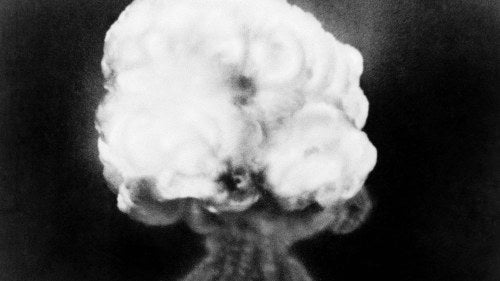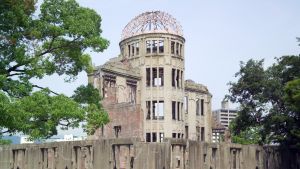Do Nukes Make the US Safer? Americans Are Unsure

While the public believes nuclear weapons are an effective tool in deterring aggression, less than half say they make the country more secure.
As a mushroom cloud bloomed over the New Mexico desert in 1945, American physicist J. Robert Oppenheimer famously recalled a line from the Hindu scripture Bhagavad Gita: "Now I am become Death, the destroyer of worlds.” The explosion, caused by the first test of an atomic bomb, demonstrated the devastating power of nuclear technology—and set in motion a debate over whether it would ultimately cause more benefit or harm.
Where do Americans stand on nuclear weapons today? New polling from the Chicago Council on Global Affairs and Carnegie Corporation of New York finds the public is conflicted.
The Power of Deterrence
The United States fast-tracked the development of a nuclear weapon in 1942 after learning that Nazi Germany was working on a bomb of its own. Given the enormous threat posed by this new technology, they posited, deterrence—established by America’s ability to strike back—was the only way to keep the country safe.
"Whatever the enemy may be planning, American science will be equal to the challenge."
Although there are debates about what kept the peace during the Cold War, nuclear weapons have been used in conflict just twice since their creation, when the United States struck the Japanese cities Hiroshima and Nagasaki. Even as more nations acquire nuclear weapons, including US rivals like Iran and North Korea, they have never been detonated against the United States—a fact slightly less than half of Americans primarily credit to Washington’s ability to retaliate with its own nuclear arsenal (46%).
Splits on Safety
While the public is more confident in deterrence than other means of preventing nuclear attacks, maintaining a nuclear arsenal does not necessarily make them feel more secure. Just under half of Americans say they think the US nuclear arsenal makes the country safer (47%). Meanwhile, a sizeable minority (24%) believe nuclear weapons don’t make a difference for national security, another large chunk report they don’t know enough to weigh in (19%), and 9 percent say they make the United States less safe.
Interestingly, Republicans are much more likely than Democrats to say that nuclear weapons make the United States safer (60% vs. 44%). This disparity may be due to stronger beliefs among GOP supporters that maintaining military superiority is a very effective way to achieve US foreign policy goals (66% of Republicans vs. 42% of Democrats, per the 2022 Chicago Council Survey). Perhaps the result of Cold War memories, age is also a dividing line on nuclear security: 55 percent of Americans 45 and older say the US nuclear arsenal keeps the country safer, compared to 38 percent of those 44 and younger.
The Nonproliferation Norm
Despite divisions in how Americans feel about nuclear weapons at home, the public agrees the United States should be involved in limiting their proliferation abroad. In the 2022 Chicago Council Survey, 95 percent of respondents said they think Washington should play a leading (56%) or supporting (39%) role in preventing the spread of nuclear weapons.
Destination: Disarmament?
In the world we live in today, many Americans feel safer because the United States possesses nuclear weapons. But do Americans think nukes should exist at all? As recently as 2020, most preferred a nuclear-free world, with a majority saying no countries should be allowed to have nuclear weapons (66%).
Whether that view has changed in the wake of Russia’s invasion of Ukraine and subsequent nuclear threats is a subject for future surveys to explore.


Related Content
 US Foreign Policy
US Foreign Policy
Sixty-one percent of the US public is uneasy with only the president having the power to authorize the use of nuclear weapons.
 Defense and Security
Defense and Security
Discover the power of cinema as we unpack the 'Oppenheimer' movie's ability to resurface long-forgotten fears and inspire dialogue around nuclear consciousness.
 Defense and Security
Defense and Security
While Americans may support a retaliatory strike if the United States is attacked, Council polls reveal they oppose using nuclear forces to defend allies.
